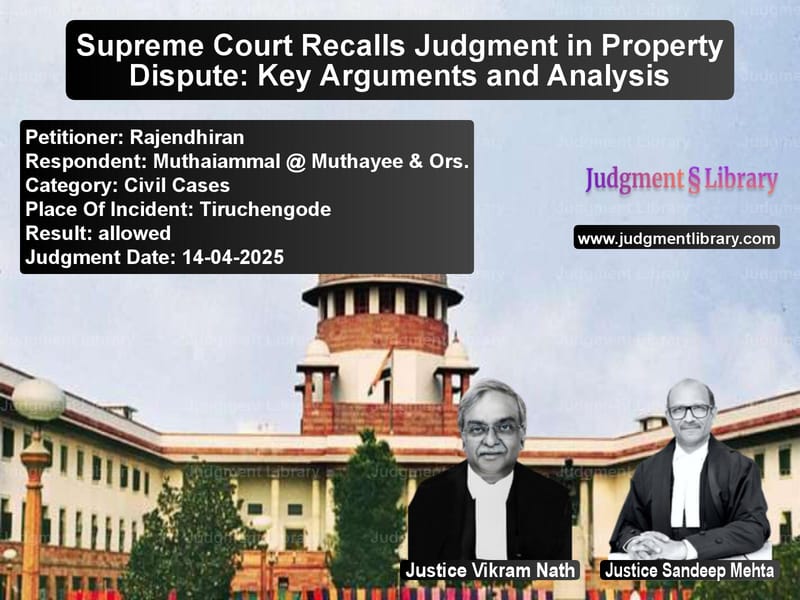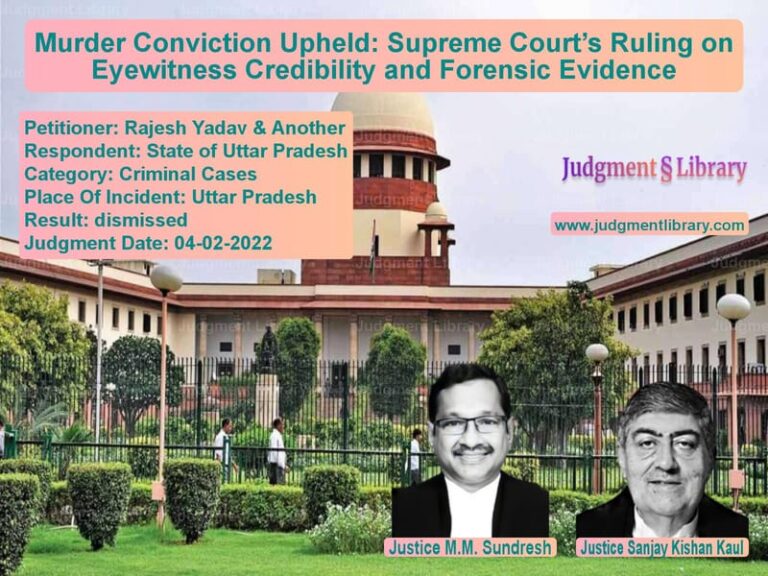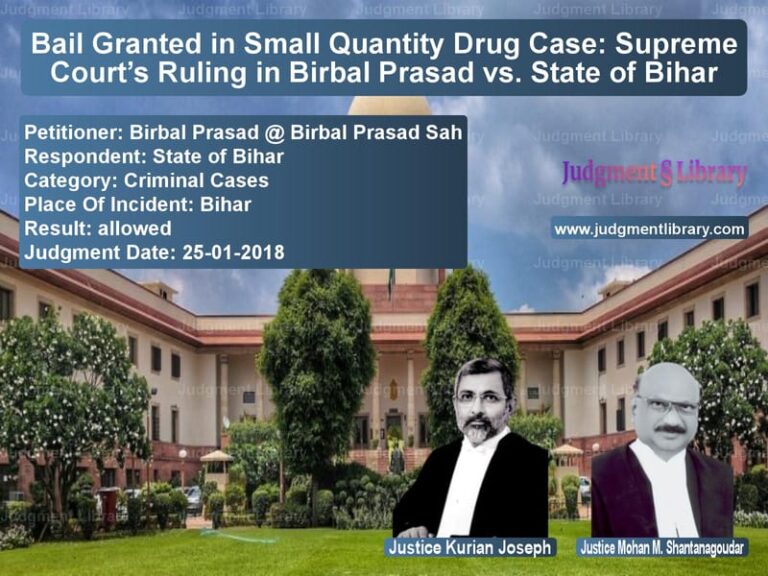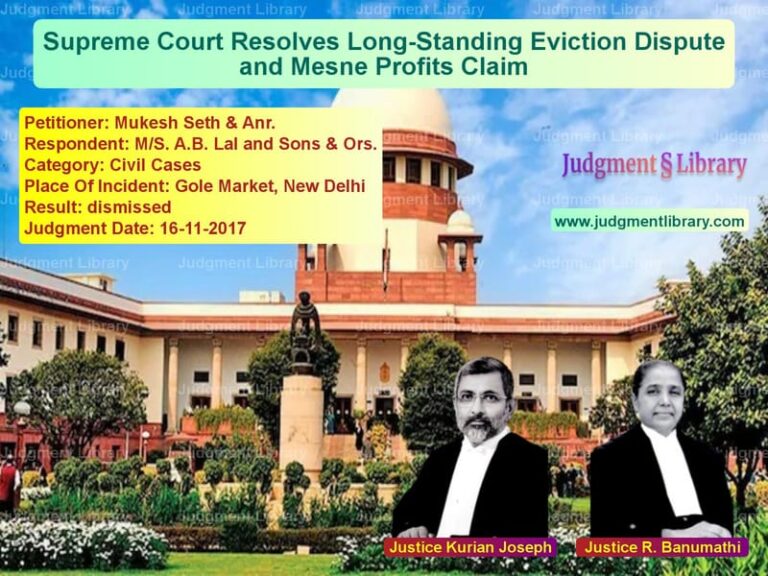Supreme Court Recalls Judgment in Property Dispute: Key Arguments and Analysis
The Supreme Court of India recently delivered a significant judgment in the case of Rajendhiran vs. Muthaiammal @ Muthayee & Ors., recalling its earlier decision dated January 3, 2024. The case revolves around a contentious property dispute involving allegations of oral partition, will execution, and non-joinder of necessary parties. This blog post provides a detailed narrative of the case, including the arguments presented by both parties and the court’s reasoning.
The dispute originated from a suit filed by the respondents (plaintiffs) before the Munsiff Court, Tiruchengode, seeking a declaration that a sale deed executed by the first defendant in favor of the second defendant was null and void. The plaintiffs claimed ownership of the property based on an oral partition among the sons of Avinashi Gounder and a will executed by Arunachalam, one of the sons. The defendants, however, denied the existence of the oral partition and challenged the validity of the will.
The Trial Court dismissed the suit, citing the plaintiffs’ failure to prove the will in accordance with the Indian Evidence Act and the Indian Succession Act. The court also noted that the suit was bad in law due to the non-joinder of necessary parties. The First Appellate Court upheld this decision, but the High Court reversed it, relying on certain documents to conclude that an oral partition had taken place. The Supreme Court, however, found the High Court’s judgment to be perverse and restored the Trial Court’s decision.
Key Arguments of the Petitioners (Defendants):
The defendants argued that the plaintiffs had failed to prove the existence of an oral partition or the validity of the will. They emphasized that the suit property was never recorded in the name of the plaintiffs or Arunachalam. The defendants also pointed out that the plaintiffs had admitted in their deposition that the survey number in question was jointly allotted to plaintiff no.1 and eight others, with no partition recorded. They contended that the High Court erred in relying on documents related to different properties to conclude that an oral partition had occurred.
Key Arguments of the Respondents (Plaintiffs):
The plaintiffs maintained that the property had been orally partitioned among the sons of Avinashi Gounder and that Arunachalam had bequeathed the suit property to them through a will. They argued that the defendants had no right over the property and that the sale deed executed by the first defendant was fraudulent. The plaintiffs relied on mortgage and sale deeds (Ex.A-3, A-4, and Ex.B-3) to support their claim of oral partition.
Supreme Court’s Observations and Decision:
The Supreme Court critically examined the evidence and found that the High Court’s judgment was flawed. The court noted, “The two sale deeds relate to different properties and not to survey number in question. Whether any partition with respect to the survey number in question had taken place or not, is not borne out from the record.” The court also highlighted that the will, which was the basis of the plaintiffs’ claim, had not been proved in accordance with the law.
The court further observed, “The High Court failed to consider the oral as also the documentary evidence. Only on the basis of the two sale deeds and one mortgage deed, which relate to different piece and parcels of land, the High Court recorded a perverse finding that oral partition had taken place.” The Supreme Court concluded that the High Court’s judgment did not conform to the scope of Section 100 of the Code of Civil Procedure, 1908, and set it aside, restoring the Trial Court’s decision.
This judgment underscores the importance of proving claims with concrete evidence and adhering to legal procedures. It also serves as a reminder of the courts’ duty to thoroughly examine all evidence before arriving at a decision.
Petitioner Name: Rajendhiran.Respondent Name: Muthaiammal @ Muthayee & Ors..Judgment By: Justice Vikram Nath, Justice Sandeep Mehta.Place Of Incident: Tiruchengode.Judgment Date: 14-04-2025.Result: allowed.
Don’t miss out on the full details! Download the complete judgment in PDF format below and gain valuable insights instantly!
Download Judgment: rajendhiran-vs-muthaiammal-@-muthay-supreme-court-of-india-judgment-dated-14-04-2025.pdf
Directly Download Judgment: Directly download this Judgment
See all petitions in Property Disputes
See all petitions in Succession and Wills
See all petitions in Contract Disputes
See all petitions in Landlord-Tenant Disputes
See all petitions in Specific Performance
See all petitions in Judgment by Vikram Nath
See all petitions in Judgment by Sandeep Mehta
See all petitions in allowed
See all petitions in supreme court of India judgments April 2025
See all petitions in 2025 judgments
See all posts in Civil Cases Category
See all allowed petitions in Civil Cases Category
See all Dismissed petitions in Civil Cases Category
See all partially allowed petitions in Civil Cases Category







